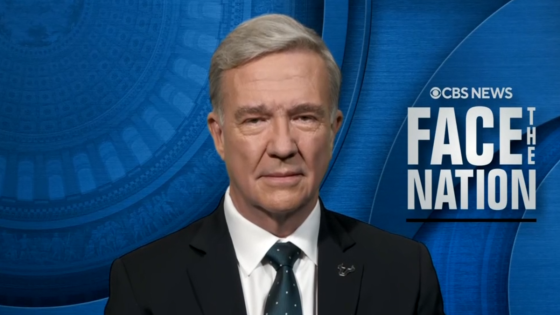The following is a transcript of an interview with retired Gen. Frank McKenzie, former commander of U.S. forces in the Middle East, on “Face the Nation with Margaret Brennan” that aired on Oct. 6, 2024.
MARGARET BRENNAN: To discuss the ongoing conflict in the Middle East, we go now to retired General Frank McKenzie, who was the former commander of US forces in the Middle East. It’s good to have you back with us, General, we saw–
GENERAL FRANK MCKENZIE: Good to be with you, Margaret.
MARGARET BRENNAN: We saw the US and Israel say there would be severe consequences for what Iran did with those 180 missiles fired at Israel, President Biden said he doesn’t support an Israeli strike on Iran’s nuclear facilities, and he’d be thinking instead about alternative targets to oil fields. What do you expect the US to do, and what do you expect to happen in the next few days?
GEN. MCKENZIE: Well, Margaret, let’s begin by saying Iran is the country that’s in a corner. Their strike against Israel several nights ago was not particularly successful. Their principal ally in the region, Hezbollah has been decapitated, and its own offensive capability is gravely limited. Hezbollah’s is gravely limited. So Iran’s on their back heel. Israel has a lot of choices here. They can choose for something that would be very escalatory in terms of a strike against the Supreme Leader himself, perhaps, or against the nuclear program, or against the oil infrastructure, or they could look at military intelligence targets. They have a wide variety of options that they can choose from. They have the capability to execute most of those attacks, I will say this, the nuclear target is a very difficult target. It’s large and complex. I held the plans for that when I was a central command commander. I’m very familiar with it. There are a lot of other alternatives to that target that perhaps you could go after first, then hold out in case you get into an escalatory ladder with the Iranians. But the Israelis are certainly going to hit back, and I predict it will be larger than the very restrained, very modulated response that we saw in April after the first large Iranian attack on Israel.
MARGARET BRENNAN: You heard the Republican Chair of the House Intelligence Committee not advocate for an attack on nuclear facilities, but say it shouldn’t be taken off the table. It’s been widely reported for some time, General that it’s only the United States who could effectively take out the underground facilities that Iran has. Does that remain the case?
GEN. MCKENZIE: Well, let me begin by saying you should never take a potential target off the menu. You want your adversary to have to plan to defend everything. So giving-giving them assistance and not knowing and not-not having to defend against a particular target is probably not the best way to establish this kind of deterrence. Having said that, the Iranian nuclear target is a very difficult target, we have special capabilities that allow us to get at it. The Israelis do not have all of those capabilities. They can certainly hurt this target if they choose to, if they choose to strike it. But again, because of its size, complexity and scope and how it’s expanded over the last 10 years, it’s a very difficult target to take out. It would be very resource intensive, and I would just, I would argue, just from a purely military point of view, there are perhaps targets that are more productive to hit in an initial response.
MARGARET BRENNAN: Do you want to give us some options?
GEN. MCKENZIE: Well, again, you know, we talked about some of them. I think oil infrastructure is certainly a possibility. And the oil infrastructure can be very broad. You can look at refineries, you can look at storage facilities, you can look at locations where the oil is unloaded onto ships. So within the oil target, it’s not monolithic. You can- you can be escalatory or less escalatory, as you look at targets there. That might be something to take a look at, but I’ll tell you the other thing, Margaret, is the Iranians made a big show of targeting the Mossad headquarters in urban Tel Aviv. Israel certainly has the capability to go after IRGC, Islamic Republican Guard Corps headquarters and intelligence buildings all around Tehran or anywhere else. Again, as we know from April, Israel has the ability to operate not with impunity, but with great force over Iran at a time and place of their choosing. And I’m sure they’re thinking about all those options right now.
MARGARET BRENNAN: There’s also that risk of unintended consequences, since you’ve characterized Iran as cornered here, are you at all concerned that this could be the kind of event that would trigger them to actually pursue a nuclear weapon? They’ve given themselves options, but they’ve never fully pursued it in the way that US intelligence has said the supreme leader would have to make the ultimate decision to do. Could this be the trigger event?
GEN. MCKENZIE: Margaret, it’s always been my belief that the Iranians flirt with breakout, with getting fissile material to create a bomb in order to extract concessions from us, because we dance, we’re very eager to come to an agreement with them on the nuclear issue, so they know they can get stuff from us. They also know if they cross that line, you can’t go back. That’s a Rubicon that can’t be recrossed. But even if they, even if they do develop the fissile material, which they can do, within a matter of days or weeks, they still have a delivery problem. They’ve got to create a missile and an entry system that will allow it to take the missile to Tel Aviv or whatever target they choose. That’s a matter of many months, and that’s the valley of death for Iran, because during that period of time, they will have declared nuclear, and they will be vulnerable. It’s not a physics problem, then it’s an aeronautical engineering problem, and the aeronautical engineering systems in Iran are going to be vulnerable to attack. So it’s not as easy as you might think for them to just declare, you know, we’re going nuclear, or to go nuclear. They’ve got to balance a number of things as they do that.
MARGARET BRENNAN: Important context. If I can ask you, sir, former President Trump, as you know, faces an ongoing assassination threat as revenge for ordering the killing of Qassim Soleimani, that Iranian general. You played a key role in that, and I know you face threats as well. Mr. Trump recently said, big threats on my life by Iran. The entire US military is watching and waiting. The Biden White House has condemned the threats, but some Republicans say it’s not loud enough. How do you think this should be messaged? Do you think Iran is getting the message not to go through with this?
GEN. MCKENZIE: So whenever we look at Iran, we need to look at what’s their basic motivation. The principal goal of Iranian statecraft is regime preservation. They view the election of President Trump as a direct threat to that regime preservation. So I have no doubt believing that Iran is very active in its attempts to go after the former president, as well as other officials, of which I am keenly, personally interested as well. But I think that-that’s what’s driving their behavior. Is desperation. Margaret, it’s actually the same sort of desperation that drove the massive attack on Israel of three or four nights ago. They’re in a corner and they really don’t have any good options, but they don’t want to sit still and do nothing. They view President Trump as worse than the alternative that could be elected.
MARGARET BRENNAN: General, thank you for your analysis.
Source Agencies



